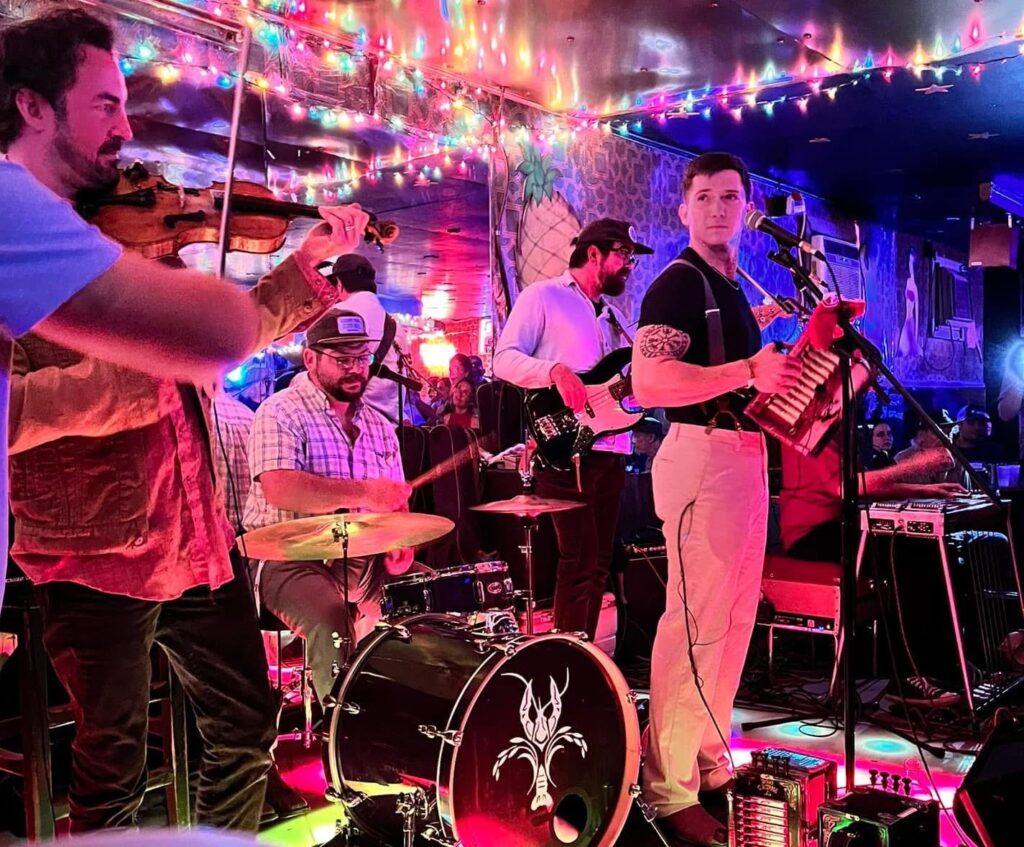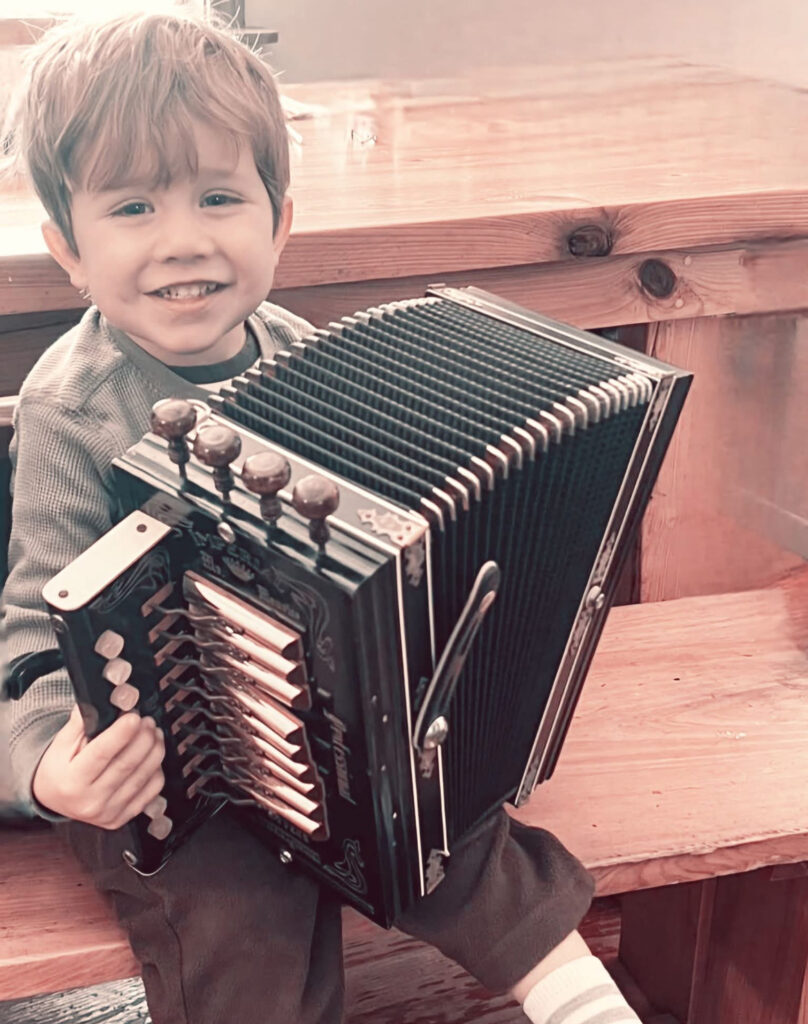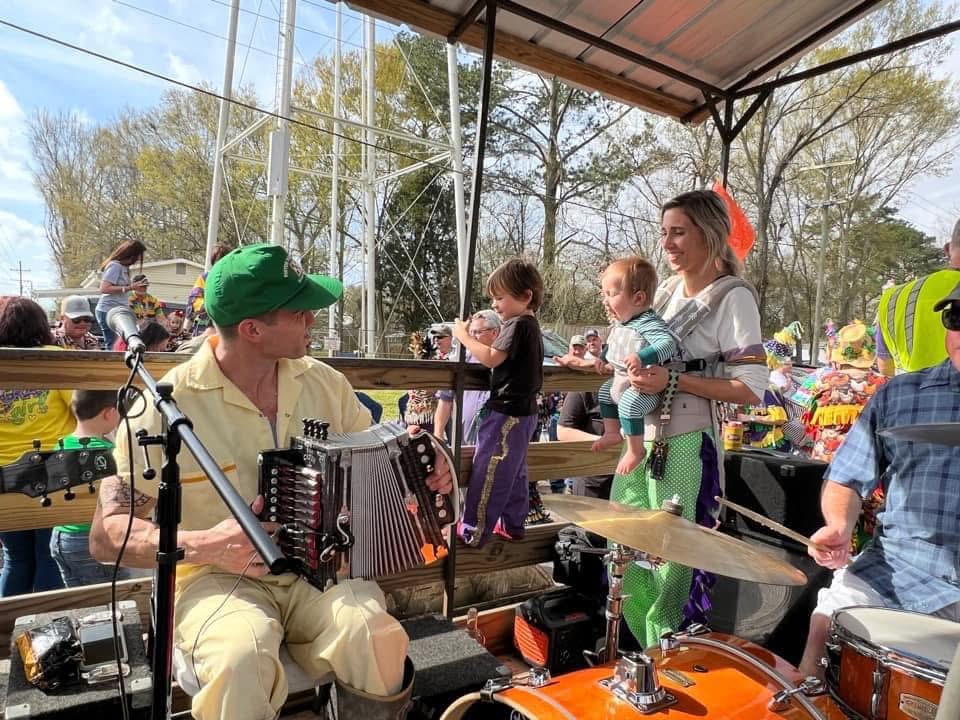Gabriel is Dead: Kyle Huval’s mission to stem the fading of Cajun culture
EUNICE, LA — In Longfellow’s eternal poem, Evangeline, he tells the story of a young Acadian woman who is separated from her beloved Gabriel during the British expulsion of the Acadians. She spends years in search of him, driven by unwavering love, hope and devotion. In a tragic and poignant ending, she finally finds Gabriel on his deathbed, and he dies in her arms.
In today’s iteration of the story, the Evangeline of Southwest Louisiana doesn’t weep—she doesn’t remember Gabriel, because she never knew him. He was driven out of Louisiana by another kind of expulsion, and if he ever does come back, Evangeline won’t be waiting for him – he’s dying in his own arms.
At 34, this is the bleak and ominous reality Kyle Huval faces. Being among the few remaining allegorical Gabriels of Cajun music who doesn’t resemble Elvis in Las Vegas, trapped in a caricature of himself, he doesn’t simply pander to an inauthentic exploited image of days gone by. He’s returned to his Evangeline, his hometown in Eunice, without the cheap TikToks or an accentuated accent made for social media.
Before his two sons Amédée and Ambrose are awake, he’s already working. Later, he’ll teach at a local school, go home, tend to his animals, his farm and garden, cook supper with his wife, and maybe if the day allows, pick up his accordion. For Kyle, his culture is not a job, it’s not a brand or a forethought. It’s merely his life. What he does is keep going, as the world around him forgets what he remembers.
“I didn’t start playing French music because I wanted to be different,” he says, leaning back in his chair, “I played because it was real, and it was our own.”
His musical path began at age 11 during the Eunice Courir de Mardi Gras. Amid the chaos, Kyle heard the wail of the accordion. Not on a stage, but on the back of a trailer. That sound stopped him in his tracks.
“I knew I wanted to do it. I wanted to play music. At first it was the guitar, but we didn’t have one.”
Appropriately, an old Hohner four-stop accordion was easier to find in his working-class Eunice neighborhood than a guitar. That’s what he learned on—taught by locals in Eunice and guided by the ever-present local Cajun jam at the time. A few years later when his father thought he was serious enough, Kyle upgraded to a Louisiana accordion handmade by Larry Miller.
By 14, he was on stage at Fred’s Lounge in Mamou, one of the last remaining honky-tonks in Louisiana. Back then, he could find a jam just about anywhere: Ronnie’s, Savoy Music Center, Nick’s on 2nd, or someone’s porch on any given night of the week.
Now, those scenes are rare. Nick’s quietly stopped their jams over a decade ago, and the establishment itself burned down in 2024. The house jams have dried up. Except for the few local Acadiana establishments remaining, a community once bustling with multigenerational players cultivates fewer musicians each year.
“The thing that kills me,” Kyle says, “isn’t just that there’s less of it. It’s that no one really cares.”
Language has fared no better. Ironically, the French language of Cajun country is now merely an imposed classroom subject opposed to a living language. While Kyle’s parents’ generation often lament that their parents never taught them French or point to forced Americanization as a culprit, Kyle pushed back. Kyle agrees with the unapologetic words of Edwin Edwards, the late French speaking Cajun governor and son of a sharecropper from Marksville who said: “People don’t speak French anymore because they were stupid enough to be ashamed of it.” Huval believes it wasn’t just punishment or policy that killed the language—it was indifference and apathy.
“People say, ‘They weren’t allowed to speak it in school.’ And yeah, that happened. But let’s be honest, most people just didn’t care. It wasn’t cool to be Cajun.”
Some people are changing their tune. Kyle is among a very small chorus of young men and women his age who are clinging to those dying embers. When 11-year-old Kyle picked up that worn Hohner accordion, he went to his grandmother, Pearl, and asked her to agree that from then on, they would only speak French. Slowly, through persistence and patience, he learned his language.

His grandmother’s influence manifested itself in his own band, The Dixie Club Ramblers. The name comes from Pearl’s father, Kyle’s great-grandfather, who owned the Dixie Club on the edge of town headed towards Opelousas. Before it burned in 1955, it was just one of a dizzying number of dancehalls that once scattered the area, hosting the likes of Austin Pitre and Iry Lejeune.
People often ask Kyle why he doesn’t play more. “Where?” he asks. Today, those places are just about all gone. Despite that, Kyle has resurrected their spirit through his music. Not just by playing those old songs recorded a thousand times over, but by writing his own. In an era where ten Cajun bands might be made up of the same four musicians recycling the same standards, Kyle has taken a different path. As others have opined, “I just didn’t want to be another jukebox,” he says. “Those songs are our standards, but how many times can you record ‘Jolie Blonde’ or ‘The Kaplan Waltz’?”
Huval’s songs, featured on albums like “Straight Allons” and “Amédée’s Waltz”, ask what it means to be Cajun when your culture is treated like just another holiday on the calendar.
“Most folks playing the music now, they only sing in English, new music often just comes from the Zydeco crowd, that the consumer conflates with Cajun… they don’t know the difference.”
Because what’s fading is not just the music or the language, it’s the context. In the land of the Evangeline Oak, the lived experience of being Cajun is now almost entirely contrived. When boucheries become ticketed events, when immersion teachers are flown in from abroad, when curated festival stages replace family gatherings and the dancehall, what’s lost isn’t performance—it’s purpose.

To Kyle, it is merely a product of the age where bite sized thought, reduced characters, and the fast food like popular culture is all most young people have ever known; naturally, being “Cajun” has taken on a similar, elastic meaning. With few exceptions, its manifestation is no longer like a homemade commodity but more of an assembly line product. Where people are starving for something real, now that its gone. But the new “product” will still be perpetuated by self-described folklorists and academics who never knew Evangeline. They will never know what it’s like to float the bayou for wood ducks, hand fish in spotted cat holes, pick up a plow or sit pilot side in a combine during rice harvest. Nor will they admit from their ivory tower, that only family can bring back this God-fearing, strong rural people.
The fading culture isn’t being erased by force. It’s fading because most people chose to discard it. And yet, in places like the Huval household, you can still faintly hear it: a fiddle, a child’s voice singing along in French to the radio, the low pump of an accordion in the kitchen. It’s quiet, but it’s honest, and it’s real.



